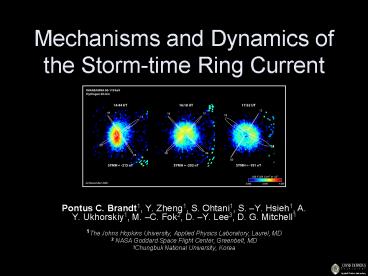Mechanisms and Dynamics of the Storm-time Ring Current - PowerPoint PPT Presentation
Title:
Mechanisms and Dynamics of the Storm-time Ring Current
Description:
Mechanisms and Dynamics of the Stormtime Ring Current – PowerPoint PPT presentation
Number of Views:22
Avg rating:3.0/5.0
Title: Mechanisms and Dynamics of the Storm-time Ring Current
1
Mechanisms and Dynamics of the Storm-time Ring
Current
- Pontus C. Brandt1, Y. Zheng1, S. Ohtani1, S. Y.
Hsieh1, A. Y. Ukhorskiy1, M. C. Fok2, D. Y.
Lee3, D. G. Mitchell1 - 1The Johns Hopkins University, Applied Physics
Laboratory, Laurel, MD - 2 NASA Goddard Space Flight Center, Greenbelt, MD
- 3Chungbuk National University, Korea
2
- SOURCES
- MECHANISMS
- DYNAMICS
- COUPLING
3
SOURCES
4
(No Transcript)
5
STORM MAIN PHASE Plasma is convected sunward,
around the duskside for southward IMF. Plasma is
energized on the nightside. Drift trajectories
are open.
STORM RECOVERY PHASE Convection weakens during
northward IMF. Alfven layer expands and plasma
drifts magnetically on closed trajectories.
6
- Southward IMF O from ionosphere to plasmasheet
- Substorm dipolarization O energize
non-adiabatically over a wide radial range - Protons are less energized (adiabatic)
- Depending on convection, some fraction of O
drift out through the magneto pauseand some stay
trapped. - The longer the storm (or the stronger the
substorm), the more energetic O
Hamilton et al., 1998.
7
1130
1150
1210
1230
FUV/WIC
OXYGEN 96-222 keV
HYDROGEN 60-198 keV
8
1310
1330
1350
1250
FUV/WIC
OXYGEN 96-222 keV
HYDROGEN 60-198 keV
9
1450
1510
1410
1430
FUV/WIC
OXYGEN 96-222 keV
HYDROGEN 60-198 keV
10
1530
1550
1610
FUV/WIC
OXYGEN 96-222 keV
HYDROGEN 60-198 keV
11
MECHANISMS
12
(No Transcript)
13
Fok et al., JGR, 2006.
14
ENA PRODUCTION
LINEARILIZED EQUATION
CONSTRAINED SOLUTION
Constrained linear inversion can be used to
retrieve the ion intensities and the plasma
pressure of the ring current. Given ENA images
and instrument response function, the technique
uses a magnetic field model, exospheric and
atmospheric neutral density models and spatial
and pitch-angle distributions of the source ion
distribution.
DeMajistre et al., 2004
15
Vallat et al., 2004
16
PERPENDICULAR PITCH ANGLES
PARALLEL PITCH ANGLES
INVERSION VALIDATION Ion distribution and
pitch-angle components of the inversions improve
once multiple vantage points are used. In this
example a stable configuration of the main phase
ring current allowed the use of several
IMAGE/HENA images obtained from different vantage
points in the orbit to increase the accuracy of
the inversion. White lines are the
Cluster/CIS/CODIF in-situ measurements of the
perpendicular (left) and parallel (right)
pitch-angle components. Yellow and red lines are
the corresponding intensities obtained by
simulating what Cluster would have seen if it
flew through the inversion.
Brandt et al., in preparation, 2007.
17
PROTON PRESSURE 27-60 keV
after substorm 0900 UT
before substorm 0700 UT
1.6 increase
18
O PRESSURE 96-222 keV
after substorm 0900 UT
before substorm 0700 UT
3.3 increase
19
COMPRESSION MECHANISM
Lee et al., submitted, 2007.
20
COUPLING
21
(No Transcript)
22
TROUGH MODEL
- We have implemented a semi empirical
trough-conductance model based on Spiro et al.
1981 - Trough minimum scaled to Millstone Hill
observations - Plot shows auroral conductance dayside
conductance trough conductance (color scale
make it hard to tell the 0.1 mho trough red
line) - The following preliminary runs show with and
without trough conductance model - Without trough is only the background conductance
cause by spill-over from the dayside due to
rotation
23
WITH TROUGH
WITHOUT TROUGH
SAPS (weak)
SAPS (strong)
Magnitude of ionospheric (VxB) velocities with
and without trough conductance model. The
westward velocities are immediately increased as
expected. Note that colorbars are different.
24
WITH TROUGH
WITHOUT TROUGH
DOWNWARD REGION-2 FAC
DOWNWARD REGION-2 FAC
FAC densities in the ionosphere. When trough is
included (1) stronger downward duskside FAC
density (2) expansion towards midnight.
25
EVOLUTION OF ELECTRON PSD DURING 09/07/2002 STORM
Initial conditions
105 electrons
K2 MeV _at_ L6.7
?2.3?103 MeV/G
f (L, t0) BA2002
L??(B0/B)1/3
26
DYNAMICS
27
Ring Current Dynamics
The ring current is highly responsive to changes
in solar-wind conditions and can completely
change morphology in a couple of hours. The
sequence of HENA images captures the transition
from the storm main phase (highly asymmetric) to
the storm recovery phase (symmetric).
28
(No Transcript)
29
(No Transcript)
30
(No Transcript)
31
(No Transcript)
32
(No Transcript)
33
(No Transcript)
34
(No Transcript)
35
(No Transcript)
36
CONCLUSIONS
- OXYGEN
- energized effectively during storm-time
substorms. - Relative increase of O pressure is twice that of
protons. - PLASMA PRESSURE
- key quantity of the ring current
- MI-coupling Brandt et al., to be submitted, AGU
Monogr., 2007 - radiation belt dynamics Ukhorskiy et al., 2006
- CONDUCTANCE
- especially in the sub-auroral region strongly
affects the electric field of the inner
magnetosphere and therefore the RC distribution
and its associated currents. - DYNAMICS
- Ring current pressure is highly asymmetric during
storm main phase and centered around midnight
Brandt et al., 2002 Ebihara et al., 2002 - Distribution changes within a couple of hours
from highly asymmetric to almost symmetric - The ring current moves around during storm-time
substorm injections. Inner edge 0.1 RE and outer
edge several RE.
37
(No Transcript)
38
End
39
Extra
40
(No Transcript)
41
RAPID RESPONSE
Brandt et al., JGR, p. 1359, 2002.































